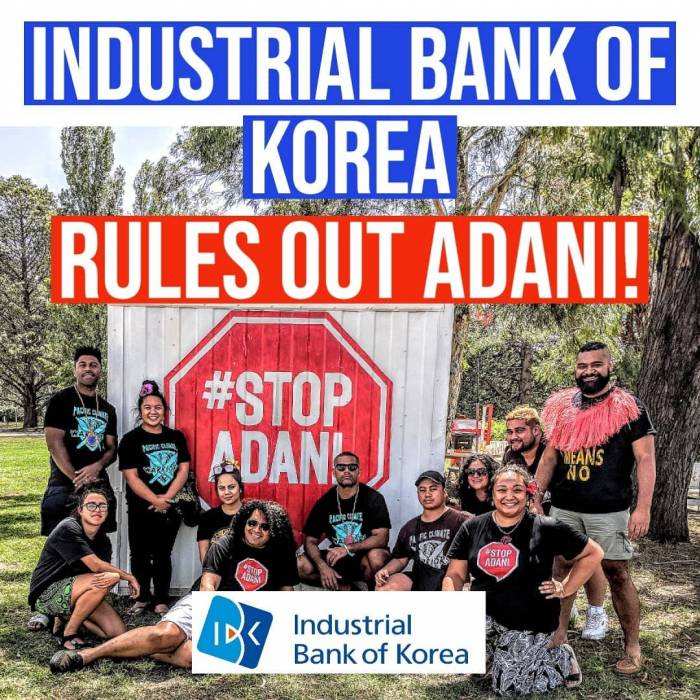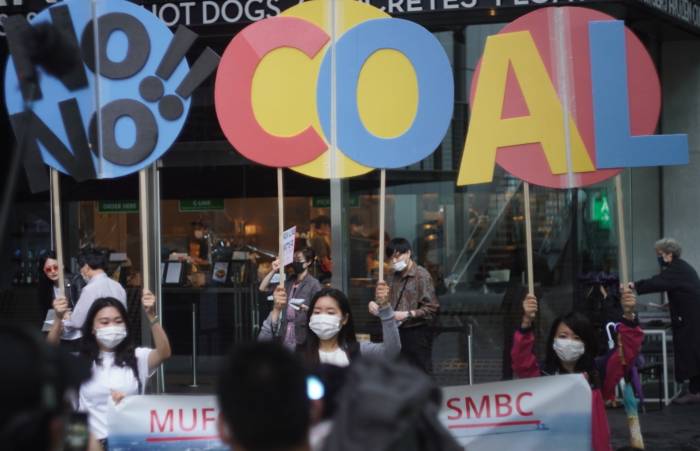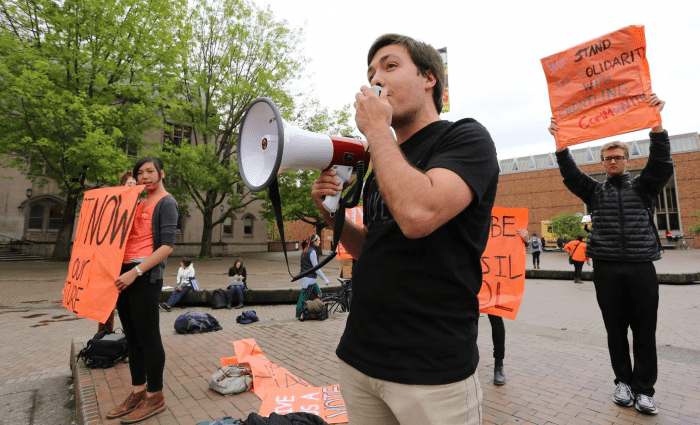Fossil Free News is a global climate movement newsletter from 350.org. Sign up here for more updates

Pacific climate warriors penned letters to the South Korean Government and the President of the Industrial Bank of Korea. These letters called on them both to rule out any further financing of the Adani Abbot Point Terminal (AAPT), or any of Adani’s coal projects. Photo: 350 Pacific
Last week, the Industrial Bank of Korea ruled out funding the Adani Abbott Point Terminal and any other projects that cause harm to Australia’s environment, largely thanks to powerful letters from the Pacific Climate Warriors, delivered to the Korean government by the Korean Organisation Solutions for Our Climate.
Earlier that same week, Wangan and Jagalingou Traditional Owners of the land in Queensland’s Galilee Basin where the mine is being built, issued Adani with an eviction notice. For five days, they enforced this eviction notice by lighting the spirit fire on the main access road to the mine site. Adani’s truck and vehicle movement was stopped. Indigenous landowners reclaiming their land AND kicking out dirty fossil fuel projects? Yes.
Every battle matters but this fight is crucial as the Adani coal mine would be one of the world’s biggest carbon bombs.
What else is happening?

Banking on it: Massive online protests around the world forced Japan’s Sumitomo Mitsui Banking Corporation’s withdrawal from the Green Climate Fund (GCF), a global fund under the auspices of the UN climate pact allocated for low-emission and climate-resilient development. Celebrate here.

Pawa up: 50 young climate activist across the Pacific region and diaspora graduated from the Pacific Pawa Up Fellowship, a training program designed to equip young Pacific Islanders with the skills they need to do impactful climate justice organizing in online spaces and transfer those skills to their offline organizing post-COVID 19. The participants emerged from the fellowship with newfound skills and a depth of knowledge of climate action in the times of COVID 19. Read more.
Inside Story
Never forget: August 26th marked the fourteenth anniversary of the Phulbari massacre. A day where 50,000 people marched to protest a planned coal mine in Phulbari, Bangladesh. After paramilitary forces opened fire three people lost their lives and hundreds got injured.
But in a stark reminder of what’s at stake, Bangladesh’ government has plans to open a further 29 coal mines. Even despite the country being devastated by the longest running flood in its recent memory only two weeks ago. Read more
Spotlight

Alex Lenferna, 350.org South Africa Climate Justice Campaigner
Pass the mic: There are many diverse voices that make up the climate movement and we’d like to spotlight some of the amazing people behind powerful wins against the fossil fuel industry. Alex Lenferna is the South African Climate Justice Campaigner with 350.org Africa and a key voice behind the Green New Eskom campaign.
“In South Africa, the climate justice movement is becoming more diverse and intersectional, bringing together new allies to push for a transformational vision of climate justice. At the beginning of this year, I had the honour of being nominated as the secretary of the Climate Justice Coalition – a coalition of South African trade unions, civil society, grassroots, and community-based organisations. The coalition represents a broadening and deepening of the climate justice movement beyond just traditional environmental groups. It recognises that climate justice is connected to and tied to the broader fights for a more socially and ecologically just South Africa. We know that if we are to overcome the power of polluters and politicians blocking action on climate justice, it is going to take all of us fighting together.” – Alex Lenferna.
You can read more of Alex’s work in this piece in the Guardian. Both of Alex’s parents are from the small island nation of Mauritius, which was recently struck by a major oil spill. While the spill is devastating, he also wanted readers to know that the much bigger longer-term threat is climate change.
Ones to watch
Landmark: Six young people from Portugal have filed a ground-breaking climate case against 33 countries with the European Court of Human Rights. The four children and two young adults are from some of the worst-hit areas of Portugal, plagued by wildfires and extreme heat waves that are bound to get worse. The case centres on the rising threat which climate change poses to their lives and to their physical and mental wellbeing. If successful, the EU, the UK, Switzerland, Norway, Russia, Turkey and Ukraine would be legally bound, not only to ramp up emissions cuts, but also to tackle overseas contributions to climate change, including those of their multinational companies.
Catarina Mota, one of the young adults behind the case, said: “It terrifies me to know that the record-breaking heatwaves we have endured are only just the beginning. With so little time left to stop this, we must do everything we can to force governments to properly protect us. This is why I’m bringing this case.”
Read more about and follow this case at youth4climatejustice.org
Use your power
Tell us the cost: Spending billions of dollars on the Canadian TransMountain pipeline in the midst of a pandemic, recession and the climate crisis is unthinkable. But that is exactly what could happen. What is the true cost of the Trans Mountain Pipeline? Canadian Finance Minister Bill Morneau has been keeping a tight lid on the actual figures, that went up from $5 billion in 2018, to $13 billion in public money this past February. Now that he’s resigned after conflict-of-interest allegations we may finally know the truth.
Add your voice to tell Prime Minister Trudeau and newly appointed Finance Minister Chrysta Freeland that the Canadian people have the right to know how their public money is being spent.